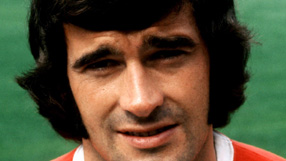
Storey, long since retired and living a blessedly relaxed life in the south of France after running into more than his fair share of troubles after quitting football, is scathing about those who now purport to fill his clogging, big boots.
"I think a lot of players today really don't know how to tackle properly," he told Reuters in a telephone interview.
"Most of the full-backs today are good at going forward but not so good at defending. Even at international level, they're converted wingers really.
"Tackling, and that ability to stay on your feet and pressurise a player, is a dying art."
Invariably included on any list of 1970s hard men, Storey had the honour of being described as the "bastard's bastard" by no less a judge than Ron "Chopper" Harris of Chelsea.
He relished going up against some of the greatest players to have graced the game and Johan Cruyff and the entire Leeds United team under Don Revie can attest to what a hard and fiercely determined opponent Storey was.
"I really enjoyed those battles," says Storey, a key member of Arsenal's 1971 double-winning team, warming to his theme.
The best features, fun and footballing quizzes, straight to your inbox every week.
"I liked to get in and hit them hard early - you could still tackle from behind in those days and you knew if you flattened someone early on you would only get a warning from the ref.
"Sometimes it would be a hard, legitimate tackle, sometimes not legitimate but it was important to let the opponent know from the start that he was in for a long afternoon."
In his recently published autobiography True Storey - My Life and Crimes as a Football Hatchet Man, the now 65-year-old, who described the diving that mars the modern game as "pathetic", said: "I didn't feel any remorse or sympathy if I injured a rival. I went over the top a few times but I never broke anyone's leg.
DIRTY JOB
"It was a dirty job but someone had to do it and I did it well. Getting tight, closing opponents down and generally making their lives a misery."
Apart from the obvious clampdown on wild tackles, Storey is frustrated by the disappearance of other aspects of defending.
Like many others whose reputations have been warped by years of highly selective black and white replays, there was much more to Storey's game than kicking people up in the air, as 19 England caps and 501 appearances for Arsenal attest.
"I could play a bit and I enjoyed using the ball but I was good at defending and they sort of pushed me in that direction," said Storey, whose template as a defensive midfielder now earns plaudits and fortunes for players such as Claude Makelele.
"When you're young and desperate to hold on to a place in the team you do whatever is asked of you."
When Storey left the game in 1978 after a brief spell with Fulham he found that the traditional retirement routine of running a pub failed to reap the profits he expected.
Short of money he strayed onto the wrong
 Join The Club
Join The Club





